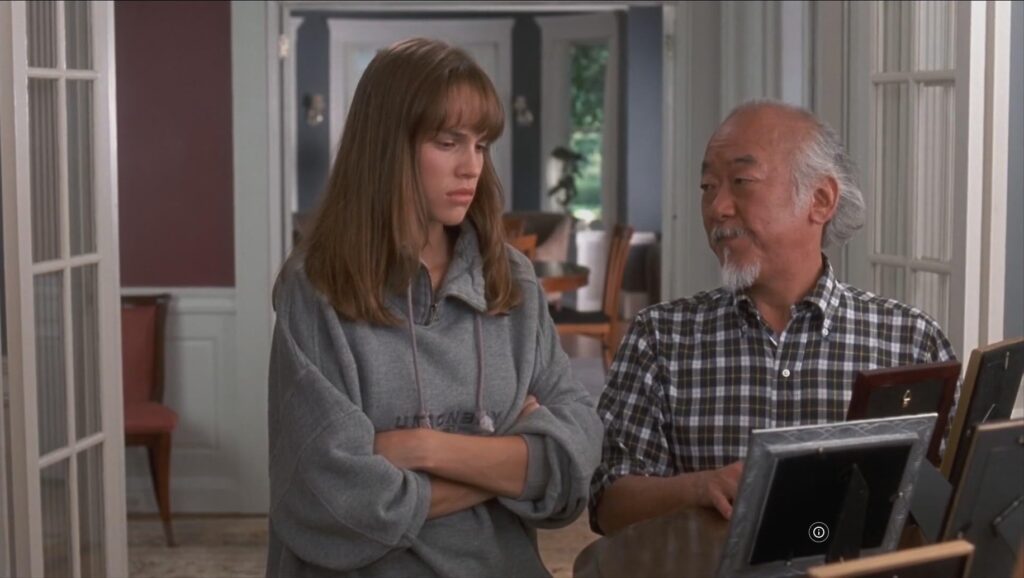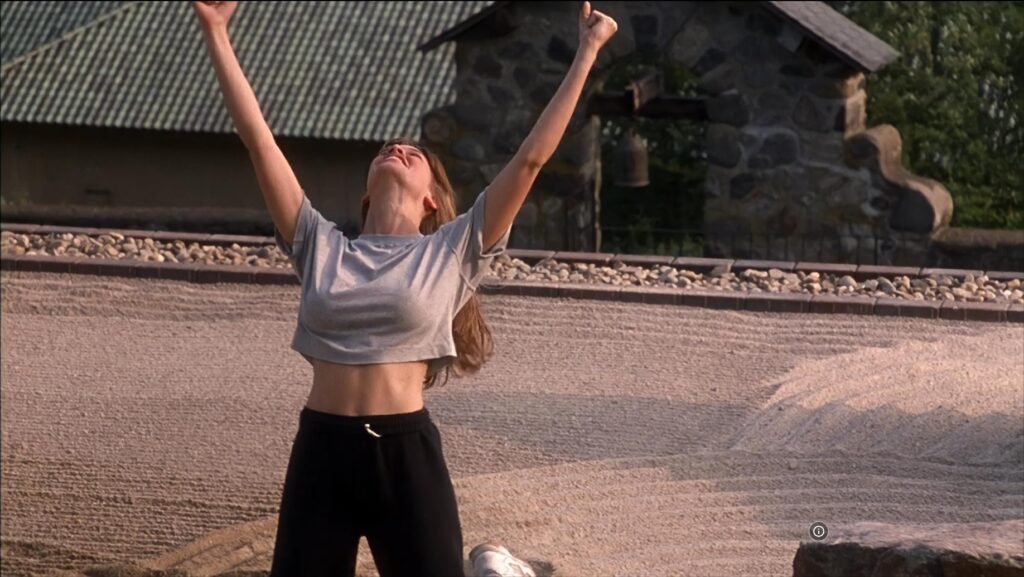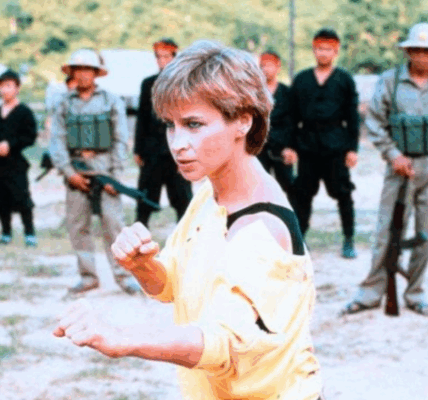1. Plot Summary
The Next Karate Kid shifts the focus of the classic martial arts saga to a new student. Mr. Miyagi, attending a WWII veteran’s ceremony, meets the granddaughter of a fallen comrade: Julie Pierce, a troubled teenager struggling with grief, anger, and alienation after her parents’ death. She lashes out at school, feels misunderstood by her grandmother, and carries a burden of loss.
Recognizing her pain, Miyagi steps in to mentor her. He teaches Julie discipline and peace through karate, guiding her not just in fighting techniques but in balance, respect, and healing. The film explores Julie’s growth as she faces bullies at school, a militarized group of hall monitors led by a harsh instructor, and her own inner turmoil.
Through Miyagi’s wisdom, training sequences, and moments of gentle humor, Julie learns to transform her anger into strength, channeling karate as a way of life rather than aggression.

2. Notable Elements
Strengths:
- Pat Morita’s performance: Once again, Mr. Miyagi is the emotional core — calm, wise, and compassionate.
- Female protagonist: Hilary Swank’s Julie brings a new dynamic, giving the series its first central heroine.
- Mentor-student dynamic: The Miyagi-Julie relationship balances discipline and tenderness.
- Themes of grief and healing: The film tries to go beyond fights, focusing on emotional recovery.
- Animal symbolism: Julie’s care for a hawk adds a metaphor for freedom, trust, and patience.
Weaknesses:
- Formulaic story: It reuses the same mentor-student structure of earlier films, with fewer surprises.
- Weak antagonists: The villains feel cartoonish compared to the grounded conflicts of the original trilogy.
- Tone shifts: It sometimes oscillates awkwardly between heartfelt drama and cheesy action.
- Limited depth for Julie: While Swank gives sincerity, the script often reduces her struggles to clichés.
3. Themes and Messages
- Healing through mentorship: Julie finds direction through Miyagi’s patient guidance.
- Discipline vs. Aggression: Karate as a philosophy of peace contrasts with the militaristic bullying of her peers.
- Generational bonds: Miyagi honors his promise to his comrade by helping Julie, bridging war-era sacrifice with present struggles.
- Grief and growth: Julie’s arc is about transforming personal loss into resilience.
- Empowerment: The film offers a female-centered martial arts story, rare in the 1990s mainstream.
4. Personal Impressions
What impressed me:
- The chemistry between Pat Morita and Hilary Swank, which grounds the film emotionally.
- Miyagi’s humor and wisdom remain timeless, softening the film’s weaker elements.
- The hawk subplot was surprisingly touching, tying Julie’s growth to themes of patience and release.
What didn’t work as well:
- The antagonists lacked the depth and menace of earlier villains like Cobra Kai.
- The script leans heavily on familiar beats without innovating much.
- The tone sometimes felt dated, with dialogue and scenes that haven’t aged gracefully.

5. Audience Recommendations
Will enjoy if you:
- Are a fan of Mr. Miyagi and want to see his wisdom passed to a new generation.
- Appreciate stories of mentorship, healing, and empowerment.
- Like Hilary Swank and want to see one of her early roles.
- Value karate as philosophy, not just fighting.
Might not enjoy if you:
- Expect intense martial arts choreography — the action is lighter compared to earlier films.
- Prefer strong, layered villains.
- Dislike formulaic sequels that don’t take many risks.
6. Conclusion & Rating
The Next Karate Kid is a heartfelt but uneven continuation of the beloved franchise. While it lacks the freshness and impact of the original trilogy, it delivers emotional moments through Miyagi’s mentorship and Swank’s earnest performance. As a story about grief, healing, and empowerment, it has value, though it stumbles with weak antagonists and predictable plotting.
Star Rating: ★★★☆☆ (3/5)




